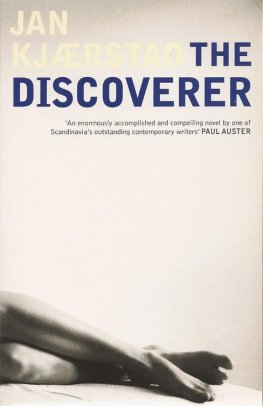Jan Kjaerstad - The Discoverer
Here you can read online Jan Kjaerstad - The Discoverer full text of the book (entire story) in english for free. Download pdf and epub, get meaning, cover and reviews about this ebook. year: 2009, publisher: Arcadia Books, genre: Prose. Description of the work, (preface) as well as reviews are available. Best literature library LitArk.com created for fans of good reading and offers a wide selection of genres:
Romance novel
Science fiction
Adventure
Detective
Science
History
Home and family
Prose
Art
Politics
Computer
Non-fiction
Religion
Business
Children
Humor
Choose a favorite category and find really read worthwhile books. Enjoy immersion in the world of imagination, feel the emotions of the characters or learn something new for yourself, make an fascinating discovery.
- Book:The Discoverer
- Author:
- Publisher:Arcadia Books
- Genre:
- Year:2009
- Rating:3 / 5
- Favourites:Add to favourites
- Your mark:
- 60
- 1
- 2
- 3
- 4
- 5
The Discoverer: summary, description and annotation
We offer to read an annotation, description, summary or preface (depends on what the author of the book "The Discoverer" wrote himself). If you haven't found the necessary information about the book — write in the comments, we will try to find it.
The Discoverer — read online for free the complete book (whole text) full work
Below is the text of the book, divided by pages. System saving the place of the last page read, allows you to conveniently read the book "The Discoverer" online for free, without having to search again every time where you left off. Put a bookmark, and you can go to the page where you finished reading at any time.
Font size:
Interval:
Bookmark:
Jan Kjaerstad
The Discoverer
For Martin
~ ~ ~

Jupiter
Behold this man. Behold this man, as he feels three tugs on the rope and slowly, after smiling uncertainly, proceeds to traverse, to edge out onto those dauntingly airy galleries. Behold this man as he inches across the rock face; see how with the caution of the novice he feels his way forward using all of his limbs, his whole body in fact, before shifting his weight from one foot to the other. I can sense how frightened, how truly terrified he is, and yet how full of the determination to do this, to see it through, make it to the top. And then, suddenly, as if something has ground to a halt, he freezes. He shuts his eyes. He looks as though he is listening to the wind, while at the same time concentrating hard, trying to place the scent emanating from the rock against which he is pressed. The bright sunlight glitters off the cliff face, sparkles in the runnels of meltwater. As far as I can see he is holding his breath. I have known it all along. This is the moment of truth. On a ledge, with a drop of hundreds of metres into the abyss only a step away. Here you live, or you die.
This is a second I shall remember.
Then he does the one thing I have begged him not to do. He half turns, while apparently hanging on tight with both hands. He looks out. Looks down. As if intent on defying something. Proving something. For a moment he seems to be completely dazzled by the Slingsby glacier far below. Or no, not dazzled, but stunned, panic-stricken. Psyched out, as they say. I refuse to believe it. That this man could be afraid of anything, a man who brought thousands of cars to a halt on Oslos Town Hall Square and who, by his mere presence, drew a cyclone to himself; a man who has been with three fair maids at once and who would not hesitate to dive to a depth of fifteen metres without an oxygen tank. Yet he hangs there, rigid. Still holding his breath. Or am I wrong? Does he bend down ever so slightly? I think I know it sounds strange, but I almost believe he is trying to kneel.
One hand fumbles with the knot, as if he means to undo himself from the rope. Sit! I call sharply. Dont look down. But he goes on staring, seeming more mesmerised than frightened now. Or infuriated perhaps, contemptuous. As if this were a set-to with Norway itself, a confrontation for which he has waited years to stand on the edge of an abyss, without a safety net. I can see temptation written large on his face. He could let himself fall. He could realise the clich which will forever be attached to his story: that of his downfall. The final, glorious headline.
Youre perfectly safe, I shout. Its all in your head. Im jittery too now, I check that the coil of rope is securely fixed around the sharp rock next to me. I know I can trust Martin, who has led the way, hammering in pitons at regular intervals, and is now out of sight behind some large boulders, a short rope-length from the bottom of the chimney. Martin has climbed everything from the Bonatti pillar to Ama Dablam. But never with such a partner, a man who according to the newspapers lost his head and shot a woman straight through the heart. I am uneasy. The uncertainty of the figure huddled against the rock face radiates towards me. I may have miscalculated. Perhaps I should have said no after all. Then he turns to me. His face is calm. I can see that he is breathing, drawing the cool mountain air deep into his lungs, hungrily. He smiles, even raises his hand in a wave, traverses onwards.
Behold this man. Behold this man, the bearer of a mystery.
The rest of the climb went well, remarkably well. Down by the stone cottage at Bandet earlier that day I had been worried. A couple of times on the way up the ridge, on the toughest, most exposed stretch, I had considered turning back. I could see that he was gasping for breath, he looked a little lightheaded. The air was keen and thin. Over one stretch we secured our passage with a length of rope mainly for his sake and when we started climbing again he dislodged a rock which went clattering down the mountainside, leaving a whiff of gunpowder behind it. An omen. His fleece clothes and the harness made him look like a child truly, in this situation, like a helpless child. And, funnily enough, I felt responsible for him.
Arent you a little afraid of heights? I had asked him when we set out from Turtagr that morning.
I used to be. Im a different person now, he said.
We reached Hjrnet the Corner, slipped off our rucksacks. It was early in the season, and there was more snow than I was used to. Wetter and dirtier. We wouldnt be able to switch to climbing shoes. It went fine, though, with no great problems even over the few metres of real climbing up the Heftyes Renne, transformed now into a chill, slippery, icy chimney.
We reached the top around midday. I shall never forget the look of triumph on his face, the way he stretched his arms up and out. To the spring sky. All those years inside. Down. And now, only a couple of years after that first intoxicating taste of freedom: on the roof of Norway. Right at the very top. Everything below us seemed much lower, markedly so. I heard him murmur, partly to us, partly to himself: I never thought I would make it. And a moment later: But I knew I had it in me.
We sat down beside the little cairn. He studied the commemorative plaque fixed to the stone as if expecting to find his name inscribed there. There too. I took the landscape shots I needed. He said not a word, just sat there looking at the view, could not seem to get enough of this, the most spectacular panorama in Norway. The massive Jostedal Glacier, Galdhpiggen and Glittertind and all the other peaks of Jotunheimen. Alpine forms with peaks and crests, carved and gouged out by the ice. Organ pipes, he muttered suddenly. This has to be the worlds biggest organ, listen to the wind! From the massif on which we sat, two jagged ridges wound off like petrified vertebrae. What are they? he asked. Kjerringa og Mannen, I said the Woman and the Man and instantly regretted it. A strange look came over his face.
Behold this man.
We prepared for the downward journey. Just as I was wondering how he was going to cope with the abseiling, he turned the wrong way, towards the sheer drop to Skagadalen. I was about to call out, but the cry stuck in my throat. He stretched his arms out to the sides, as if about to do a swallow dive.
Why did he do it?
One has to start somewhere, and a good, not to say almost perfect, departure point or even, to stick with the climbing motif: viewpoint from which to examine Jonas Wergelands life would be another stony edifice, another gallery, a hallowed hall, a room with walls of granite, and an autumn day in the 1980s an autumn day which would bring with it deep sorrow and wistful joy, as well as a strange mystery, an incident bordering on the scandalous. Nor is it entirely inappropriate that Jonas should be at the organ, an instrument befitting his history and the power which for so long he had exerted over the minds, not to say the souls, of the Norwegian people. Jonas Wergeland is playing the organ, framed by its gleaming, monumental face, making the whole church tremble with his playing, making the very stone, the bedrock of Norway, sing. He is not an organist, but he handles the instrument almost like a professional musician; he is an organist by nature, he might have been made for this part, this pose. No wonder he once replied when asked, in Samarkand, what he did for a living: I am an organist.
Scarcely an hour earlier, after collecting a pile of sheet music, he had closed the gate of the house he would soon be moving into and which people would dub Villa Wergeland, and set off down the road he had walked every day of his childhood. Wherever he turned his eye he risked becoming lost in memories: a life-threatening bonfire, the windows Ivan broke, the wallet in the ditch which brought him a heaven-sent fifty
Font size:
Interval:
Bookmark:
Similar books «The Discoverer»
Look at similar books to The Discoverer. We have selected literature similar in name and meaning in the hope of providing readers with more options to find new, interesting, not yet read works.
Discussion, reviews of the book The Discoverer and just readers' own opinions. Leave your comments, write what you think about the work, its meaning or the main characters. Specify what exactly you liked and what you didn't like, and why you think so.











